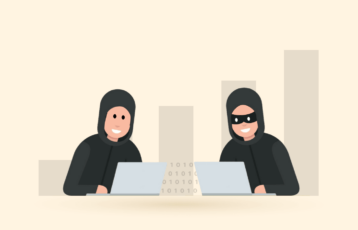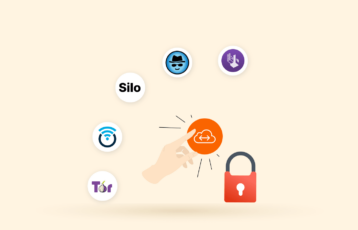When you hear of hacking and cyber attacks, most of you would perceive these terms as something from sci-fi movies.

Nonetheless, it’s high time to realize that hacking isn’t a fictional thing. Nor is it rare.
Everything is an example of a cyberattack, from cracking your personal account passwords to taking over your firm’s IT structure.
With this article, we’ll take a look at the six devastating cyberattacks that forced the victim business to shut down. We do not discuss these incidents to create fear or panic. Instead, we aim to make our readers realize the importance of cybersecurity, regardless of whether you own big or small businesses.
6 companies that were forced to shut down after cyber attacks

1. Code Spaces
Code Space was a code hosting company that existed a few years ago. It offered various project management tools to its customers.
The company suffered a devastating DDoS attack in June 2014 that caused severe service disruption. The attackers also stepped ahead to access the firm’s cloud databases and, wipe off the data backups configurations, and delete offsite backups either wholly or partially.
The attack lasted for about 12 hours. After that, the firm was left inoperable due to the very high recovery costs. The firm confirmed the reasoning behind their shutdown in a disclosure.
2. The Heritage Company
UK-based telemarketing The Heritage Company stirred the news world as it announced an unexpected shut down in December 2019. The announcement came days before Christmas, leaving around 300 employees unemployed.
What made them shut down like this? A ransomware attack!
While announcing the decision via a Facebook post, the company CEO Sandra Franecke admitted that the ransomware attack that hit the firm two months earlier caused huge losses.
Although she hoped it would be a temporary closure, things were clear. After running for 61 years, the Heritage Company has no longer existed.
3. Travelex
The British foreign exchange company Travelex is also among those companies that were forced to shut down due to hackers. Although Travelex still up and running, it has endured pretty rough times earlier this year.
The company suffered a devastating ransomware attack from the new yet notorious Sodinokibi ransomware gang. The attackers demanded $6 million as ransom while also stealing the data from the firm’s network.
The incident happened in late December 2019, after which its services went down. It then took the firm nearly four months to be up again.
In April 2020, it turned out that the company has possibly paid the ransom to the attackers for service restoration.
4. MyBizHomepage
MyBizHomepage was established in 2006 as an online service helping companies to monitor financial metrics. After running successfully for six years, the firm eventually had to go offline in 2012 due to a cyber attack.
What’s different here is that the firm didn’t suffer a random cyberattack. Instead, it was more of an insider attack.
Briefly, the company CEO fired the firm’s CTO due to a conflict overselling the firm. Out of revenge, the CTO conducted back-to-back attacks on the company’s software. Repeated claims about the company defrauding investors surfaced online, maligning the firm’s reputation.
Eventually, the events compelled the CEO to declare bankruptcy.
5. Wood Ranch Medical
An American healthcare provider, Wood Ranch Medical, also had to shut down its services due to a cyber attack in 2019. The facility suffered a ransomware attack in August 2019, locking them out of the patients’ data.
According to reports, the attack caused irreparable damage to the infected systems, making file recovery impossible.
Eventually, Wood Ranch Medical announced a permanent closure of services until December 17, 2019.
6. Youbit Cryptocurrency Exchange
Among all the companies that were forced to shut down due to hackers, the cryptocurrency exchanges included as well. One such entity was the South Korean cryptocurrency exchange Youbit.
In 2017, the exchange twice suffered cyber attacks – the first in April and then in December. The second attack proved to be the final nail in its coffin as it dragged the exchange to bankruptcy.
Top vulnerabilities that empower hackers for frequent cyberattacks

After going through the incidents compelling the companies to shut down due to hackers, you might have thought, what facilitates hackers in conducting these attacks?
Although the opportunities are endless for hackers to exploit and target businesses. Yet, in most cases, we see a similarity of causes of cyberattacks.
So, below, we list the most common issues that trigger hacking attacks.
Weak passwords
Despite reiterating the importance of setting up strong passwords, unfortunately, people still forget this critical security factor.
The practice of using weak passwords isn’t only common at a personal level, but at the corporate level too.
For instance, even the latest SolarWinds cybersecurity incident was possibly executed successfully owing to a weak and leaked password – ‘solarwinds123.’
Phishing emails and social engineering
Phishing emails are also a common vector to execute successful cyber attacks. A single click on the wrong link by a curious and ignorant employee could bring devastating results to the firm.
The recent Twitter hacking incident is just an example of it.
Less cybersecurity budget
Last, but the most important triggering factor behind cyberattacks is the less security budget. While the management doesn’t mind spending money on making their products attractive, they pay no heed to secure things unless they suffer an attack.
As a result, the potentially exploitable vulnerabilities and weaknesses persist, alluring the cybercriminals to exploit them.
According to 2019 statistics, this ignorant behavior is costing the firms around $200,000 on average. This is true for both big and small businesses. Eventually, many small-medium level firms go out of business. They suffer financial losses and lose their reputation, market stance, and consumers’ trust.
How to protect your company against hackers

Although executing cyberattacks on different firms is continuously improving, the firms can significantly avoid the damages by implementing cybersecurity best practices.
Implementing them isn’t so difficult either. All you need to do is to take care of basic security measures like:
- Setting up strong passwords for all company accounts. Say no to the “admin123” trend.
- Backup your data regularly on the cloud.
- Limit access to backups to the relevant and educated IT personnel only.
- Ensure each and every system on your company network goes through regular virus scans.
- Ensure that each and every software running on your company network is up-to-date.
- Protect your company’s network (including public WiFi) from unsolicited connections.
- Train your staff for cybersecurity best practices. Primarily, they should be made aware of phishing emails.
- Perform a thorough background check of every employee or potential candidate before hiring to prevent insider threats.
Lastly, always have a plan ‘B’ to cope up with a potential security incident. You can even hire the services of a credible cybersecurity firm to help you secure your organization.






